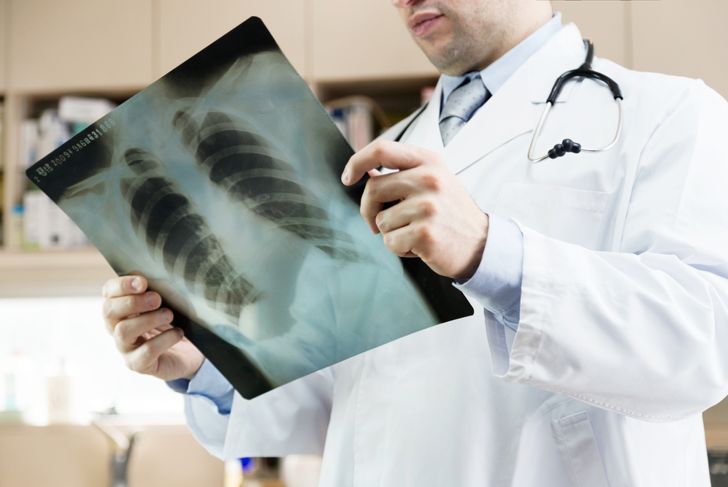Damage to the lungs can cause systemic failure throughout the human body. There are many factors involved in developing lung cancer, including hereditary and environmental influences and smoking. Anyone who experiences prolonged respiratory signs and symptoms should speak to a doctor and be tested for lung cancer or other conditions that pose significant health risks.
Coughing
Though coughing is a symptom of lung cancer, many irritants and other conditions can cause a cough as well. Individuals who are long-time smokers, especially, may overlook this symptom because they have become accustomed to a “smoker’s cough.” A person who develops a cough that does not go away and does not seem to be brought on by obvious environmental triggers should be tested for respiratory illness.
Spitting Up Blood
Coughing up blood has a number of possible causes. While it could be lung cancer, it may also be a different serious or life-threatening condition or illness. Therefore, this symptom needs immediate evaluation, especially if a person coughs up large amounts of blood or also complains of shortness of breath, lightheadedness, or chest pain. The medical term for coughing up blood is hemoptysis; typically, the expectoration is bright red blood mixed with mucus. A chest x-ray may help to identify the cause, although more advanced imaging studies may be necessary.
Chest Pain
Chest pain is more likely to bring to mind heart problems, but issues with the lungs, including cancer, can also cause this symptom. Chest discomfort caused by a tumor usually worsens when laughing, coughing, or taking a deep breath. Small cell lung cancer usually begins in the bronchial tubes, which are in the middle of the chest. Pain can start here and radiate outward. This pain may also be felt in the shoulders, neck, upper back, and abdomen. Although the lungs themselves have no nerve fibers to carry pain messages, the lining of the lungs and surrounding structures do.
Hoarse Voice
A hoarse voice can be a symptom of a cold or other minor illness, but it can also develop in people with lung cancer. Another symptom, such as a persistent cough, can cause hoarseness due to irritation. Excess mucus in the throat and breathing passages can also cause this rasp. As a long-lasting hoarse voice can indicate laryngitis or even lung cancer, this symptom should be investigated by a doctor.
Weight Loss
Substantial weight loss without any changes to diet or activity level can indicate a variety of underlying illnesses, including lung cancer. Weight loss can be a side effect of the body burning more energy to fight infection or underlying cancer; it can also be due to the feeling of fullness some people with cancer experience after eating a small meal. Furthermore, when it is hard to breathe, it is even more challenging to eat. Significant loss of appetite is also common in the later stages when cancer has spread to the liver. However, weight loss can be an early sign of lung cancer too, and may occur before the cancer is diagnosed.
Weakness
Weakness without a clear cause, or symptoms that worsen over time, could indicate a serious condition such as lung cancer. If discomfort accompanies the lasting fatigue, this is an even greater indication of a potentially serious issue. Not only do breathing difficulties lead to fatigue and weakness, but tumors can also release hormone-like substances that change the level of sodium and calcium in the blood and cause muscle weakness.
Labored Breathing
So many different issues and conditions, both minor and serious, can cause shortness of breath, that this is an oft-overlooked symptom of lung cancer. When cancer is the cause, it is due to blockages in the lung sacs and bronchial tubes. Tumors often make it more difficult for the lungs to fully expand.
Recurring Chest Infections
Lung cancer can increase an individual’s risk of recurring infections and illnesses, especially those that affect the respiratory system. Though viral or bacterial infections are no different than a healthy person might develop, it is often more difficult for those with lung cancer to recover from these otherwise minor conditions. Infections may also return with more severity as the immune system becomes more and more focused on fighting cancer.
Yellowing Skin
People with lung cancer may experience jaundice, which causes a yellowing of the skin and whites of the eyes. This signifies the cancer is spreading to the liver. The symptom develops as the liver becomes increasingly unable to remove excess bilirubin, a waste compound that causes jaundice. Other signs of jaundice include darkening of the urine and stools that are light in color.
Bone Pain
Lung cancer can spread to other parts of the body, which is why early detection is so important. Unfortunately, the non-specific symptoms of the disease often cause it to go undetected until it has spread to other areas. One location to which lung cancer may spread is the bones. When this metastasis occurs, symptoms include back pain, changes in bowel or bladder habits, and muscle weakness. Some people also develop bone fractures because cancer damages and weakens the bones.

 Home
Home Health
Health Diet & Nutrition
Diet & Nutrition Living Well
Living Well More
More




















